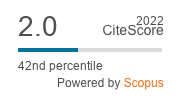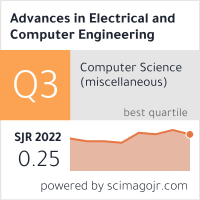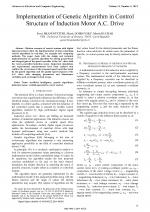| 4/2014 - 3 |
Implementation of Genetic Algorithm in Control Structure of Induction Motor A.C. DriveBRANDSTETTER, P. |
| View the paper record and citations in |
| Click to see author's profile in |
| Download PDF |
Author keywords
Artificial intelligence, genetic algorithms, induction motor, variable speed drive, vector control
References keywords
genetic(9), motor(8), drive(7), control(7), algorithm(7), systems(6), speed(5), intelligent(5), induction(5), controllers(5)
Blue keywords are present in both the references section and the paper title.
About this article
Date of Publication: 2014-11-30
Volume 14, Issue 4, Year 2014, On page(s): 15 - 20
ISSN: 1582-7445, e-ISSN: 1844-7600
Digital Object Identifier: 10.4316/AECE.2014.04003
Web of Science Accession Number: 000348772500003
SCOPUS ID: 84921640821
Abstract
Modern concepts of control systems with digital signal processors allow the implementation of time-consuming control algorithms in real-time, for example soft computing methods. The paper deals with the design and technical implementation of a genetic algorithm for setting proportional and integral gain of the speed controller of the A.C. drive with the vector-controlled induction motor. Important simulations and experimental measurements have been realized that confirm the correctness of the proposed speed controller tuned by the genetic algorithm and the quality speed response of the A.C. drive with changing parameters and disturbance variables, such as changes in load torque. |
| References | | | Cited By «-- Click to see who has cited this paper |
| [1] P. Vas, Artificial-intelligence-based electrical machines and drives. Oxford science publication, 1999.
[2] P. Fedor, D. Perdukova, "Energy optimization of a dynamic system controller," in Proc. International Joint Conference CISIS'12-ICEUTE'12-SOCO'12 Special Sessions, Book Series: Advances in Intelligent Systems and Computing, 2013, vol. 189, pp. 361-369. [3] T. Orlowska-Kowalska, M. Kaminski, "FPGA implementation of the multilayer neural network for the speed estimation of the two-mass drive system," IEEE Transactions on Industrial Informatics, vol. 7, no. 3, pp. 436-445, 2011. [CrossRef] [Web of Science Times Cited 118] [4] S. Maiti, V. Verma, C. Chakraborty, Y. Hori, "An adaptive speed sensorless induction motor drive with artificial neural network for stability enhancement," IEEE Transactions on Industrial Informatics, vol. 8, no. 4, pp.757-766, 2012. [CrossRef] [Web of Science Times Cited 105] [5] A. Saghafinia, H. W. Ping, M. A. Rahman, "High performance induction motor drive using hybrid fuzzy-PI and PI controllers: A review," International Review of Electrical Engineering - IREE, vol. 5, no. 5, pp. 2000-2012, 2010. [6] P. Girovsky, J. Timko, J. Zilkova, "Shaft sensor-less FOC control of an induction motor using neural estimators," Acta Polytechnica Hungarica, vol. 9, no. 4, pp. 31-45, 2012. [7] K. M. V. Chandrakala, S. Balamurugan, K. Sankaranarayanan, "Genetic algorithm tuned optimal variable structure system controller for enhanced load frequency control," International Review of Electrical Engineering - IREE, vol. 7, no. 2, pp. 4105-4112, 2012. [8] N. Ozturk, "Speed control for dc motor drive based on fuzzy and genetic PI controller - A comparative study," Elektronika Ir Elektrotechnika, no. 7, pp. 43-48, 2012. [9] M. Abachizadeh, M. R. H. Yazdi, A. Yousefi-Koma, "Optimal tuning of PID controllers using artificial bee colony algorithm," in Proc. International Conference on Advanced Intelligent Mechatronics, Montreal, Canada, 2010, pp. 379-384. [10] A. Rajasekhar, A. Abraham, R. K. Jatoth RK, "Controller tuning using a Cauchy mutated artificial bee colony algorithm," Advances in Intelligent and Soft Computing, Springer Verlag Berlin, vol. 87, pp. 11-18, 2011. [11] D. E. Goldberg, Genetic algorithms in search, optimization and machine learning. Boston: Addison-Wesley Publishing Comp., 1989. [12] M. Viteckova, A. Vitecek, Selected methods of adjusting controllers. VSB-Technical University of Ostrava, 2011. [13] P. Brandstetter, T. Krecek, "Speed and current control of permanent magnet synchronous motor drive using IMC controllers," Advances in Electrical and Computer Engineering, 2012, vol. 12, no. 4, pp. 3-10. [CrossRef] [Full Text] [Web of Science Times Cited 28] [14] H. Ben Jmaa Derbel, "Design of PID controllers for time-delay systems by the pole compensation technique," in Proceedings of the 6th International Multi-Conference on Systems, Signals and Devices, 2009, pp. 1-6. [15] A. Rezazadeh, "Genetic algorithm based servo system parameter estimation during transients," Advances in Electrical and Computer Engineering, vol. 10, no. 2, pp. 77-81, 2010. [CrossRef] [Full Text] [Web of Science Times Cited 5] [16] P. Palacky, P. Hudecek, A. Havel, "Real-time estimation of induction motor parameters based on the genetic algorithm," in Proc. International Joint Conference CISIS'12-ICEUTE'12-SOCO'12 Special Sessions, Book Series: Advances in Intelligent Systems and Computing, 2013, vol. 189, pp. 401-409. [17] M. Mitchell, An Introduction to Genetic Algorithms. Fifth printing, A Bradford Book The MIT Press, Cambridge, Massachusetts; London, England, 1999. [18] K. F. Man, K. S. Tang, S. Kwong, W. A. Halang, Genetic Algorithms for Control and Signal Processing, series Advances in Industrial Control, Springer Verlag, 211 p., 2011. [19] C. Elmas, T. Yigit, "Genetic algorithm based on-line tuning of a PI controller for a switched reluctance motor drive," Electric Power Components and Systems, vol.35, no.6, pp. 675-691, 2007. [CrossRef] [Web of Science Times Cited 27] [20] P. Brandstetter, M. Dobrovsky, "Speed Control of A. C. Drive with Induction Motor Using Genetic Algorithm," in Proc. International Joint Conference CISIS'12-ICEUTE'12-SOCO'12 Special Sessions, Book Series: Advances in Intelligent Systems and Computing, 2013, vol. 189, pp. 341-350. Web of Science® Citations for all references: 283 TCR SCOPUS® Citations for all references: 0 Web of Science® Average Citations per reference: 13 ACR SCOPUS® Average Citations per reference: 0 TCR = Total Citations for References / ACR = Average Citations per Reference We introduced in 2010 - for the first time in scientific publishing, the term "References Weight", as a quantitative indication of the quality ... Read more Citations for references updated on 2024-04-24 10:22 in 35 seconds. Note1: Web of Science® is a registered trademark of Clarivate Analytics. Note2: SCOPUS® is a registered trademark of Elsevier B.V. Disclaimer: All queries to the respective databases were made by using the DOI record of every reference (where available). Due to technical problems beyond our control, the information is not always accurate. Please use the CrossRef link to visit the respective publisher site. |
Faculty of Electrical Engineering and Computer Science
Stefan cel Mare University of Suceava, Romania
All rights reserved: Advances in Electrical and Computer Engineering is a registered trademark of the Stefan cel Mare University of Suceava. No part of this publication may be reproduced, stored in a retrieval system, photocopied, recorded or archived, without the written permission from the Editor. When authors submit their papers for publication, they agree that the copyright for their article be transferred to the Faculty of Electrical Engineering and Computer Science, Stefan cel Mare University of Suceava, Romania, if and only if the articles are accepted for publication. The copyright covers the exclusive rights to reproduce and distribute the article, including reprints and translations.
Permission for other use: The copyright owner's consent does not extend to copying for general distribution, for promotion, for creating new works, or for resale. Specific written permission must be obtained from the Editor for such copying. Direct linking to files hosted on this website is strictly prohibited.
Disclaimer: Whilst every effort is made by the publishers and editorial board to see that no inaccurate or misleading data, opinions or statements appear in this journal, they wish to make it clear that all information and opinions formulated in the articles, as well as linguistic accuracy, are the sole responsibility of the author.





